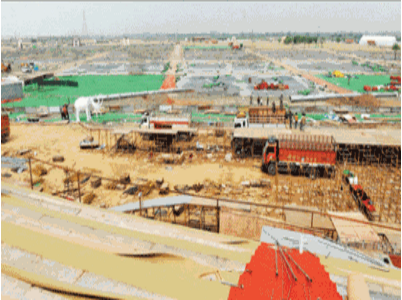
The almost 100-feet-tall and 1,200-feet-wide stage and the pontoon bridges have been dismantled, carpets removed, lights taken off and garbage cleared. Rashmi Paliwal, a trustee of AOL, said post-event 28 truck-loads of dry waste and 10 tonnes of wet waste were removed from the flood plain. BVG India, the official cleaners for the PMO and Rashtrapati Bhawan volunteered to clean area along with SPML (manufacture earth movers) and Zero Waste after the three-day extravaganza got over on March 13.
Standing on the flood plain where the monstrous stage was erected, all that one can see now is patches of grass, birds, insects and rodents reclaiming their habitat.
The AOL has come under heavy criticism for causing damage to the ecosystem of the flood plain and a case filed against them with the National Green Tribunal (NGT). The spiritual organization has been asked to pay Rs 5 crore as compensation by the NGT. The AOL has already paid Rs 25 lakh up front but now wants the NGT to scientifically prove that the flood plain has been damaged before paying any more money.
Saraswati Akhshama Nath, advocate representing AOL in the case registered with the NGT, said that officials of the NGT have only done a visual assessment of the area and based their report on it. "There were no soil and water samples taken for proper scientific testing. We are not running away from compensation but first make a scientific assessment, draw up a restoration plan and then decide the compensation amount" says Nath.
The special tribunal set up by the NGT has also asked the AOL to partly fund development of a biodiversity park on the floodplains along with the DDA. The AOL officials said that the development of the biodiversity park has been part of the DDA Masterplan for many years but hasn't been implemented yet. "We are caught in the crossfire between the NGT and the state government," said Nath.
The AOL has also been charged by the NGT of leveling the flood plain or soil compaction to bear the weight of the stage. This leads to reduced space between soil particles resulting in poor water absorption and drainage. Rakesh Ranjan, an independent environmentalist with the AOL, said that soil compaction is reversible to some extent.
Standing on the flood plains, he points to new shoots of the wide leaf reed, a signature vegetation of wetlands, which are sprouting from the soil. "If soil was compacted these plants wouldn't emerge from it," he reasons adding that due to the ongoing heat the water bodies have dried up but will refill after monsoons.
Things will perhaps become clearer after the next hearing of the case which will be held on April 21 and 22.
Courtesy: The Times of India
